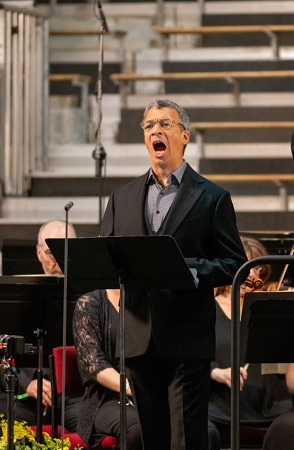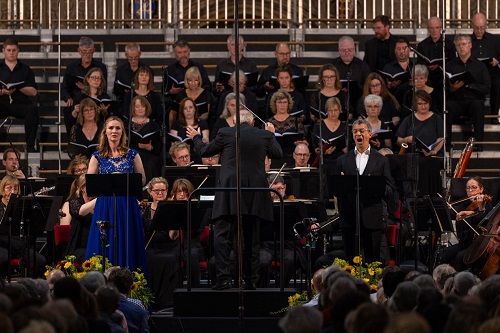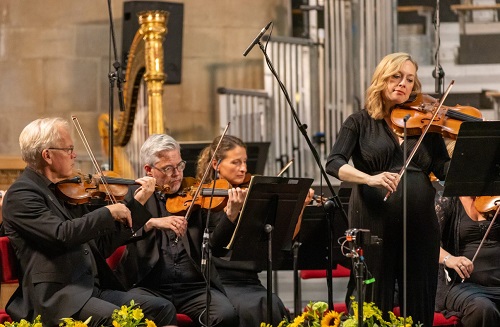This programme by the BBC National Orchestra of Wales, conducted by Martyn Brabbins, on the second evening of this year’s Three Choirs Festival presented three works that were prevailingly sombre and sometimes ‘strange’, although there were musical expressions of love, passion and friendship that brightened the general solemn tenor.
The premiere performance of Hail and Farewell (2022) by the conductor and composer Ronald Corp opened the concert. Corp’s song cycle for baritone and strings was composed in memory and celebration of the life of Carolyn Pascall, a friend and board member of the Three Choirs Festival before her untimely death in January 2022. The texts selected by Corp form a roughly symmetrical structure. At the heart lie Shakespeare and Catullus, particular favourites of Pascall and Corp respectively. Framing these are two settings of poems about carousels – which Pascall greatly loved – one, by Diana Jones, written especially at Corp’s request, the other Verlaine’s ‘Chevaux des bois’ which Debussy sets in Ariettes oubliées (1885). Enclosing the sequence are two joyful songs, William Cornysh’s ‘Pleasure it is’ and, at the close, ‘My spirit sang all day’ by Robert Bridges, these two songs sharing some musical material.
Though a prolific and adept composer, Corp is perhaps known best more for his work as a founder and conductor with groups such as the New London Orchestra, New London Children’s Choir, BBC Singers and Highgate Choral Society (Pascall was general manager of the latter for twenty years). He is an experienced writer for the voice, though, both for choral forces (sacred cantatas and shorter works for unaccompanied choir) and soloists – his oeuvre includes over one hundred songs, song cycles, as well as operas such as The Ice Mountain (for children) and The Pelican.

On this occasion, however, it was Corp’s writing for strings that was most immediately engaging – the multi-layering of the strings’ lines in fact recalling some his writing for choral ensembles. Baritone Roderick Williams, as always, worked hard to communicate with directness and warmth, but whether it was the cathedral acoustic or the density of some of Corp’s instrumental writing which was a hindrance to verbal clarity, it was hard, even when reading the poem texts – which encompassed several languages – to discern the singer’s words. Sometimes, too, Williams seemed uncharacteristically underpowered. Perhaps performed in a different setting the vocal lines would make a stronger mark, but there seemed a generally prosaic quality about Corp’s phrases which didn’t help to lift the poetic sentiments from the page and project them through the vast nave.
That’s not to suggest there weren’t moments of musical interest and expressiveness, or that Williams did not make the most of such moments. Scurrying, skipping violins captured the anonymous poet’s joy in God’s fecundity and nature’s richness in ‘Pleasure it is’, the fragmentary motifs building energetically towards the baritone’s confident assertion of praise – man’s gratitude sealed with a firm thud in the bass, a breezy gesture which drew a warm smile from Williams. At the other end of the sequence, ‘My spirit sang all day’ was jubilant, the final cadence swelling with tonal reassurance then softening comfortingly.

Corp’s harmonic language is essentially tonal and romantic, but if sometimes the progressions and devices seemed a little repetitive here, the composer also showed that he can strike a distinctive and individual note at times. In ‘Chevaux de bois’ the unfolding harmonies contributed to the strong sense of movement – “Tournez, tournez!” cries the poet-speaker – growing dissonance evoking both the wildness of the incessant, eddying spirals and the narrator’s sobering realisation that the horses are not real, while the final full consonance conjured the picturesque glow of golden stars in the twilight sky. A short, repeating rhythmic motif complemented the bouncy tetrameter of Jones’ ‘Roundabout’, and the pacy abandon of the kinetic verbs, “climb”, “race”, “soar”, captured the revellers’ freedom and joy.
Squishy harmonies and a descent into low realms conveyed the despondent self-pity and self-accusation of the poet-speaker in Shakespeare’s twenty-ninth sonnet, ‘When, in disgrace with fortune and men’s eyes’, as he reflects on the love that isolates him from his fellow men. The vocal phrases seemed rather weighted down and four-square initially, though. But, at the close a touching diminuendo seemed to reflect the transcendence of mundane earthly cares and here Williams’ declamatory power, “That then I scorn to change my state with kings”, conveyed the optimism that comes upon the speaker almost by chance, refreshing him with new-found confidence. Catullus’ elegiac ‘Ave atque vale’, which gives the cycle its title, was tender but profound, the final line, “Atque in perpetuum, frater, ave atque vale”, a powerful, unaccompanied expression of love, friendship and remembrance: “And forever, brother, hail and farewell.”
Mythic ‘ladies of the lake’ take various forms, from the Welsh lake fairies known as the Gwragedd Annwn, to the Kelpie of Scotland, the Irish goddess of the underworld, Bé Finn, (mother of the hero Fráech), and Nerthus, the Norse Germanic goddess of bogs, lakes and streams, and fresh water, among many others. In their 40-minute cantata for mezzo-soprano, baritone and orchestra, The Faerie Bride, composer Gavan Higgins and librettist Francesca Simon draw upon the Welsh legend of the Lady of Llyn y Fan Fach which is associated with Myddfai in Carmarthenshire.

The legend tells of a young man who spends long hours gazing into the waters of the lake and dreaming. One day he sees a beautiful woman slowly walk out of the water towards him, and instantly falls in love. She seems to possess mystical powers and presents him with a vision of their future together, but there are certain conditions he must accept: first, he must never strike her three times; second, he must keep her origins secret. He agrees, and over the years three sons are born to the couple as the man’s livestock and farming thrive. But in their small close-knit Welsh community of Myddfai curiosity and conflict are never far away. Ultimately, he fails her test, and she returns to the lake, calling all their animals to follow her, leaving her distraught husband and sons weeping at the edge of the lake, their anguished cries echoing across the mountains.
Simon emphasises the element of repetition which is such a feature of these myths. Not only is the cantata structured by the seasons, with a framing prologue and epilogue, but text is repeated across the ‘movements’ which run segue: “The years passed”; “Our sons grew strong … Our sons grew tall … Our sons grew up”. She also alters the nature of the misunderstandings which lead the man to break his promise. The blows he inflicts are not ‘physical’. Here, it is the otherworldliness of the woman, with her gift for second sight, which disrupts the community, rather than the man’s own growing arrogance, unsettling his place within that community and resulting in his betrayal. And, so, Simon introduces a semi-chorus of Villagers who three times interject, “Don’t like her. Don’t trust her.” The members of the Festival Chorus sang with vigour and precision, but their words are somewhat prosaic, and the turbulence that they introduce – asymmetrical rhythms, repeated, aggressive string down bows, aggressive brass swells – doesn’t entirely convince.

Higgins is most accomplished when establishing an aura which coheres pastoral lyricism and otherworldly mysticism. His harmonies, and the pace of their progression, intimate erotic tension. His handling of the orchestral forces is very adept. Not only is there much atmospheric colouring – flowing and ebbing string ‘waves’, punchy bright brass – but the sparing textures and expressive gestures – including some lovely woodwind solos, unison high violins that are almost Britten-esque and horn solos above tremolando strings adding intensity – compellingly conjure the evolving narrative. Higgins also makes use of long pedal points above which the two solo voices have lyrical and rhetorical freedom, and which the two soloists here relished and exploited.
Roderick Williams and mezzo-soprano Marta Fontanals-Simmons premiered The Faerie Bride with BBC NOW and Brabbins at the Aldeburgh Festival in 2022, and one sensed that they appreciated the opportunity to revisit the cantata. Williams delivered the Man’s narrative with deep expressive import, the text now clear and telling. Fontanals-Simmons imaginatively evoked the contrast between the Woman’s strength and vulnerability. Her singing of a Welsh folk song possessed an elemental purity. There are in effect two narrations: both Man and Woman offer retrospective accounts, sometimes their recollections overlapping tenderly, elsewhere the instrumental scores seeming to articulate the relationship – passionate but tense – between them.
There is a raspy, restless ominous quality in the latter section, Winter: darker colours, percussive thumps. The music seems to sink and slump as the lady is swallowed up, accepted back into her watery home. Higgins’ score at times has a filmic quality, but also a strong narrative current too. At the close there is a teasing, troubling silence: “Sometimes I think I hear her voice,/ when the wind whispers over the water.

There was more sensuousness and mysticism in Ralph Vaughan Williams’ poetic evocation, Flos Campi (Flowers of the Field) for viola, wordless chorus, and small orchestra. Its six continuous movements are inspired by the Song of Solomon, the music’s wistfulness blossoming at times with an exotic, Ravel-like intensity. The BBC NOW’s principal viola player, Rebbeca Jones, was a glowing thread linking the sections, by turns rapturous and dreamy, weaving eloquently through the wordless choral voices. My only wish might have been for greater clarity from the semi-chorus, for sometimes they muddied the precious instrumental textures. But, here and throughout the evening, Martyn Brabbins expertly paced the unfolding narrative, shaping the flexible, syncopated rhythms persuasively. He coaxed beautiful playing from his musicians and was an assured and reassuring guide through the contrasting moods, drawing the listener into the score’s dark, dramatic intensity and its mesmerising luminosity.
This concert was recorded for subsequent broadcast on BBC Radio 3.
Claire Seymour
Roderick Williams (baritone), Marta Fontanals-Simmons (mezzo-soprano), Rebecca Jones (viola), BBC National Orchestra of Wales, Three Choirs Festival Chorus, Martyn Brabbins (conductor)
Ronald Corp – Hail and Farewell (world premiere), Vaughan Williams – Flos Campi, Gavin Higgins – The Faerie Bride
Gloucester Cathedral; Sunday 23rd July 2023.
ABOVE: Roderick Williams, BBC National Orchestra of Wales, Three Choirs Festival Chorus, Martyn Brabbins (c) James O’Driscoll